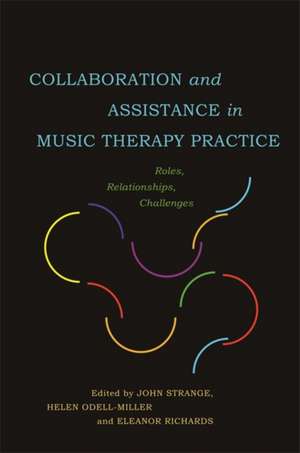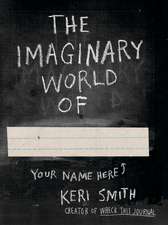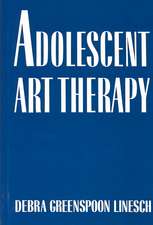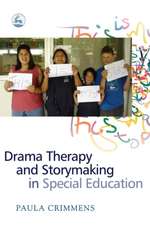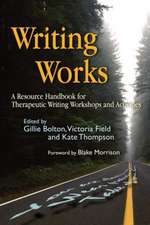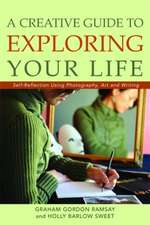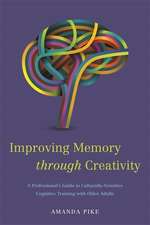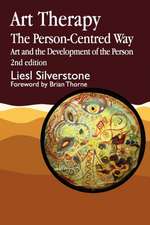Collaboration and Assistance in Music Therapy Practice
Editat de John Strange, Helen Odell-Miller, Eleanor Richardsen Limba Engleză Paperback – 21 dec 2016
Preț: 228.11 lei
Preț vechi: 306.79 lei
-26% Nou
Puncte Express: 342
Preț estimativ în valută:
43.65€ • 45.69$ • 36.12£
43.65€ • 45.69$ • 36.12£
Carte disponibilă
Livrare economică 17-31 martie
Preluare comenzi: 021 569.72.76
Specificații
ISBN-13: 9781849057028
ISBN-10: 1849057028
Pagini: 336
Ilustrații: 31 b&w figures; 31 b&w figures
Dimensiuni: 160 x 228 x 20 mm
Greutate: 0.48 kg
Editura: JESSICA KINGSLEY PUBLISHERS
ISBN-10: 1849057028
Pagini: 336
Ilustrații: 31 b&w figures; 31 b&w figures
Dimensiuni: 160 x 228 x 20 mm
Greutate: 0.48 kg
Editura: JESSICA KINGSLEY PUBLISHERS
Cuprins
Introduction. A Well-Trodden Territory in Need of a Map. John Strange, freelance music therapist, London, Helen Odell-Miller, Anglia Ruskin University, Cambridge, and Eleanor Richards, Anglia Ruskin University, Cambridge. 1. Assistants as Interaction Partners. John Strange. 2. Music Therapists' Experiences of Working with Staff in Sessions. Hannah Munro, Nordoff Robbins Scotland. 3. Student Perspectives on Working with Assistants on Placement During Vocational Music Therapy Training. Catherine Warner, University of the West of England. 4. Involving Family Members who are Primary Carers in Music Therapy Sessions with Children with Special Needs. Pornpan Kaenampornpan, Khon Kaen University, Thailand. 5. Exploring the Significance of the Role of Assistants in Music Therapy Groups in Adult and Older People's Mental Health Settings. Helen Odell-Miller. 6. 'Let Them Bring Their Own Song': A Qualitative Study of Developing Relationships Between Care Staff and Nursing Home Residents with Dementia Through Music Therapy and Dance Movement Therapy Groups. Ruth Melhuish, NHS Music Therapist, Bradford on Avon. 7. Caregivers' Dual Role in Music Therapy to Manage Neuropsychiatric Symptoms of Dementia. Ming Hung Hsu, MHA Homes and Anglia Ruskin University, Cambridge. 8. Psychodynamic Group Music Therapy Facilitates Carers to Become Auxiliary Music Therapists: A Case-Study and Methodological Analysis. Anthi Agrotou, Arte Musical Academy, Nicosia, Cyprus. 9. Supporting the Unplanned Journey: Music Therapy as a Developmental Resource with People with Profound and Multiple Learning Disabilities and Their Carers and Staff. Tessa Watson, Roehampton University. 10. From Assistance to Co-Therapy: On the Role of the Co-Therapist in Nordoff-Robbins Music Therapy. Jörg Fachner, Anglia Ruskin University, Cambridge. 11. Music and Attuned Movement Therapy: How the Facilitator Mediates Between Client and Therapist. John Strange, Mary-Clare Fearn, music therapist in health and special education, Dorset and Rebecca O'Connor, National Rehabilitation Hospital, Dublin. 12. Music and Movement: Integrated Music Therapy and Physiotherapy for People with Severe Physical Disabilities at Risk of Developing Fixed Deformities. John Strange and Lyn Weekes, physiotherapy manager and special education teacher (retired). 13. Improvised Music to Support Client-Assistant Interaction: The Perceptions of Music Therapists. John Strange. 14. Who Knows Me Best? Exploring the Collaborative Roles of Transient Practitioners and Constant Practitioners in Music Therapy. Sarah Hadley, Oxleas NHS Trust and Music as Therapy International. 15. An Inclusion Group for Primary School Pupils With and Without Profound Learning Disability. Motoko Hayata, formerly Soundscape, Newham Music Trust, and John Strange. 16. Building Musical Bridges in Paediatric Hospital Departments. Tone Leinebø, Oslo University Hospital and Trygve Aasgaard, Norwegian Academy of Music. 17. Someone Else in the Room: Welcome or Unwelcome? An Attachment Perspective. Eleanor Richards. 18. Valuing Human Resources. Training, Service Development, Research - The Way Forward. John Strange, Helen Odell-Miller and Eleanor Richards.
